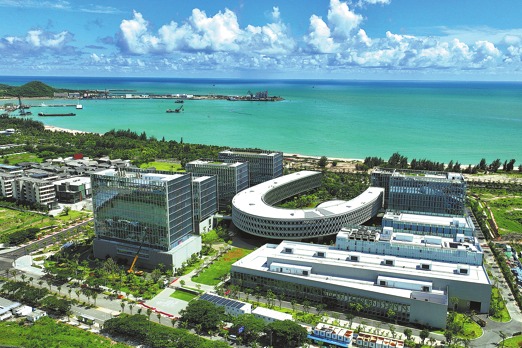An unwelcome guest


China should take measures to counter NATO's push into the Asia-Pacific, which is aimed at tackling 'challenges' from China and halting its rise
Since describing China as a country that "presents both opportunities and challenges" in the 2019 London Declaration, the North Atlantic Treaty Organization has increased its vigilance against China and mentioned the "systemic challenges" posed by China in several strategic documents. The alliance has enhanced political and security cooperation with partners in the Asia-Pacific region, such as Japan, the Republic of Korea and Australia, to expand its presence in the region.
NATO's interest in the Asia-Pacific is driven by multiple factors including the geopolitical climate, the United States' competition strategy toward China, and coordination among its European allies. The bloc's eastward expansion is aimed at fighting "China's challenges" by strengthening its ties with Asia-Pacific partners and linking together security issues in the Asia-Pacific and the Atlantic.
Since there are no detailed policies and action plans for NATO's interference in Asia-Pacific affairs, several possible scenarios exist for its eastward push.
In the first scenario, the bloc will continue expanding the scope of its collaboration with Asia-Pacific countries and deepen the level of cooperation; in the second, NATO will elevate Asia-Pacific partners to the status of quasi-allies; the third scenario will see the alliance admit new members from the region. For now, it seems that the former two scenarios are likely to become a reality.
NATO's Asia-Pacific move serves the US' strategy of countering China, and will have profound implications on the security of China's neighboring regions and the Asia-Pacific area as a whole, as well as the dynamics of China-US competition.
First, NATO's shift to the Asia-Pacific will complicate the security situation of China. The group has reached an agreement on expanding security cooperation, respectively, with Japan, the ROK, Australia and New Zealand, which will increase these countries' military interoperability with NATO, and enhance their capacities to cooperate with the bloc in operations, posing new threats to the security of China's surrounding areas. It is clear that the US is pushing NATO's eastward expansion with the aim of bringing its European allies to the Asia-Pacific to contain China.
Second, NATO's eastward expansion will undermine the multilateral security mechanisms of the Asia-Pacific. Countries in the Asia-Pacific have established a series of multilateral security regimes, including the Association of Southeast Asian Nations Defense Ministers' Meeting, ASEAN-China, Japan and ROK (10+3) leaders' meeting, and Lancang-Mekong Cooperation. These cooperation mechanisms are inclusive and open, in sharp contrast to the exclusive and confrontational nature of NATO.
Third, NATO's push to the east will drag some Asia-Pacific countries into the exclusive group, escalate bloc confrontations in the region, and increase the risk of a China-US conflict involving a third party. In addition, the bloc's expansion into the Asia-Pacific will collide with the region's existing security architecture and intensify competition among regional security arrangements.
The US has long been pursuing a strategy that balances its Atlantic and Pacific alliances to maintain its global hegemony, and gain strategic dominance in both the Pacific and the Atlantic. NATO's extending to the Asia-Pacific region will help expand the US' military and political influence in the region, and secure wider support from regional countries on security issues. Interventions from outside players have complicated the security situation of the Asia-Pacific and intensified the competition among internal and external forces.
Despite the negative implications NATO's eastward expansion may have on the Asia-Pacific region, as a collective movement, it still faces several limiting factors.
First, NATO needs to address other security concerns, such as terrorism, cybersecurity and hybrid threats, as well as nuclear proliferation. The security priorities differ among members of the alliance, hindering NATO's capacity to allocate large amounts of resources to the Asia-Pacific.
Second, NATO members have divergent attitudes toward China. The US and its European allies hold different perceptions of the "China threat", which impedes coordination among member states of NATO and the bloc's expansion to the Asia-Pacific.
Third, third-party factors are inhibiting NATO's eastward push. For instance, the"10+X" cooperation framework with ASEAN at the core has grown into a key security regime of the Asia-Pacific. NATO's intervention in Asia-Pacific affairs goes against the principle of common security upheld by ASEAN and hinders its effective operation. This may provoke opposition and countermeasures from regional states.
All in all, NATO's push into the Asia-Pacific is aimed at tackling "challenges" from China and assisting the US' strategic goal of halting China's rise. China should take measures on several fronts to counter NATO's move.
First, it is necessary for China to unequivocally oppose NATO extending its reach to the Asia-Pacific and draw a crystal-clear redline. Even some European countries are cautious about NATO's turning eastward, fearing it will exacerbate their relations with China. By expressing strong objections to NATO's eastward push, China will deter these reluctant European countries from challenging China's core interests and weaken their support for NATO's interference in Asia-Pacific affairs.
Second, China ought to strengthen economic and trade cooperation with European countries. Since the US and Europe don't share same views on the "threat" from China, and US allies have divergent economic and security interests to pursue, China should expand trade and economic cooperation with US allies to increase the costs of "decoupling" from China and prevent them from confronting China.
Third, China should also deepen collaboration with Asia-Pacific countries in more fields. The security of the Asia-Pacific is of immense significance for China's development, and thus enhancing political and security cooperation with regional states will help improve China's ties with its neighbors, and maintain the stability of the region. It is imperative for China to carry out all-round cooperation with ASEAN, stabilize economic and trade ties with Japan, the ROK, Australia and New Zealand, and expand collaboration with other regional countries to discourage them from supporting NATO's advance into the Asia-Pacific.
Fourth, instead of the NATO mechanism that focuses on bloc confrontation, the Asia-Pacific region needs a more inclusive and fair security regime that can help address security threats and safeguard the legitimate rights and interests of regional countries and counter NATO's expansion into the region. To this end, China should enhance its political and security cooperation with other regional countries and push for establishment and improvement of regional security mechanisms.
The author is director of the International Security Research Center at China Foreign Affairs University. The author contributed this article to China Watch, a think tank powered by China Daily.
The views do not necessarily reflect those of China Daily.
Contact the editor at editor@chinawatch.cn.


































